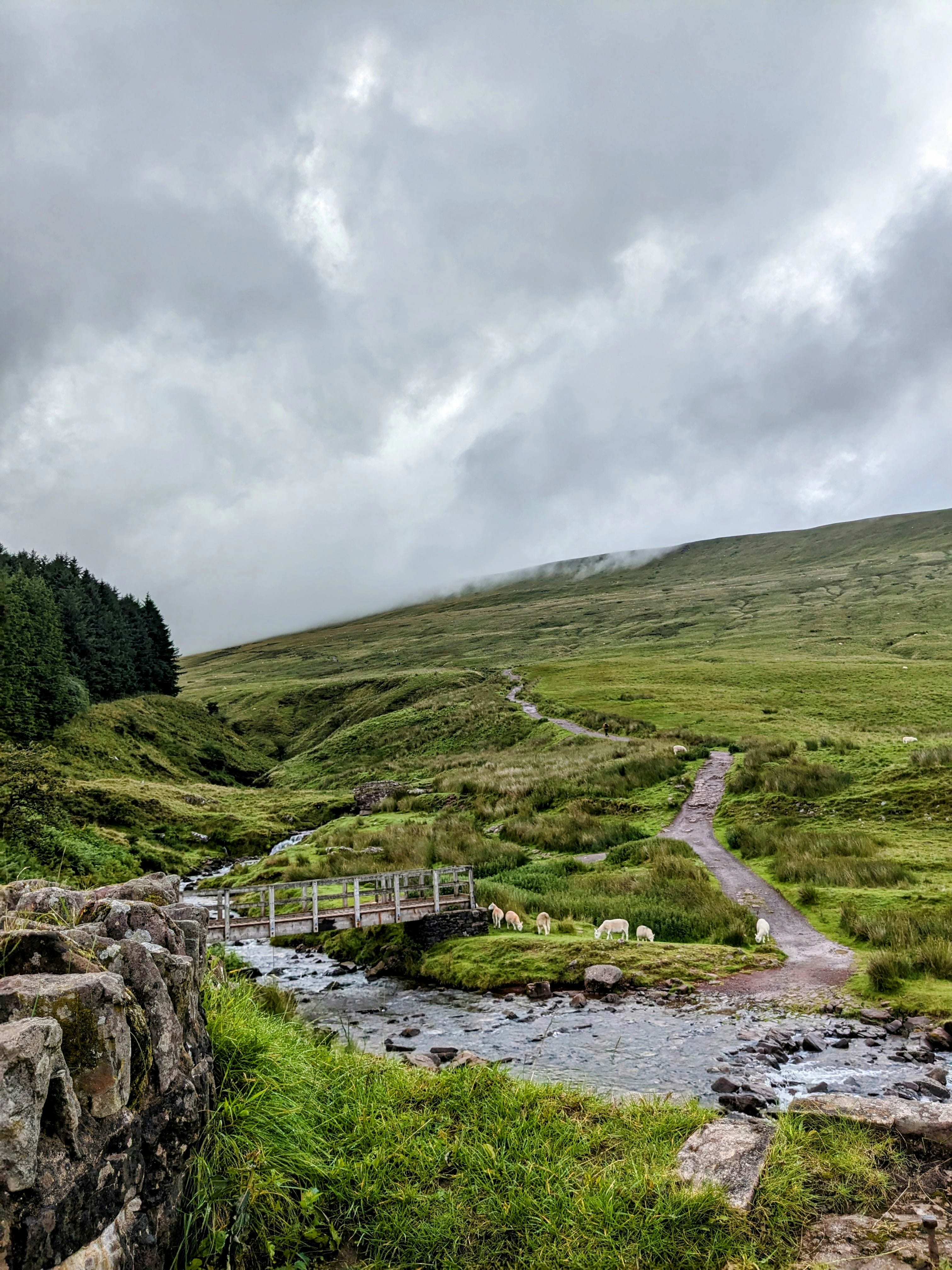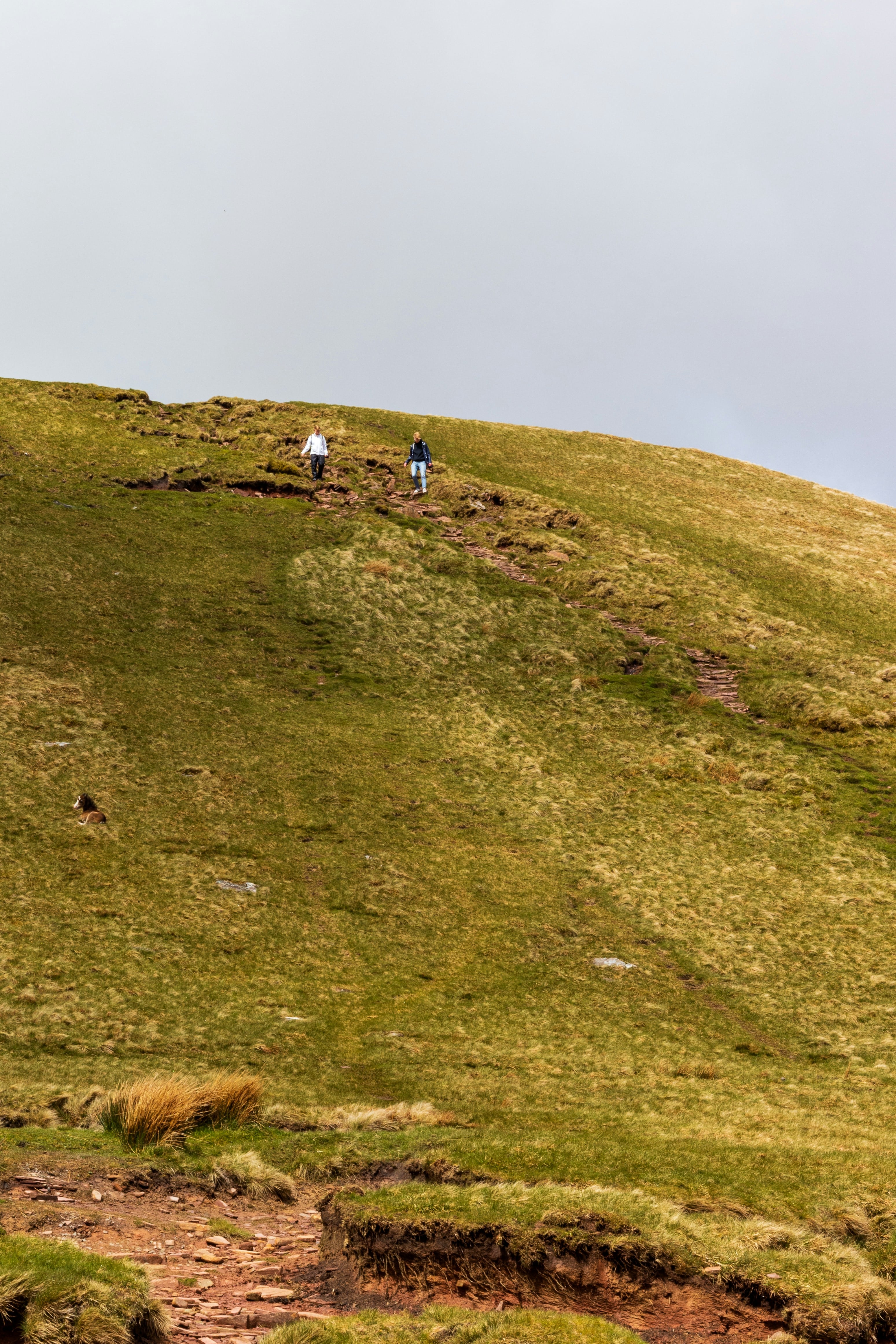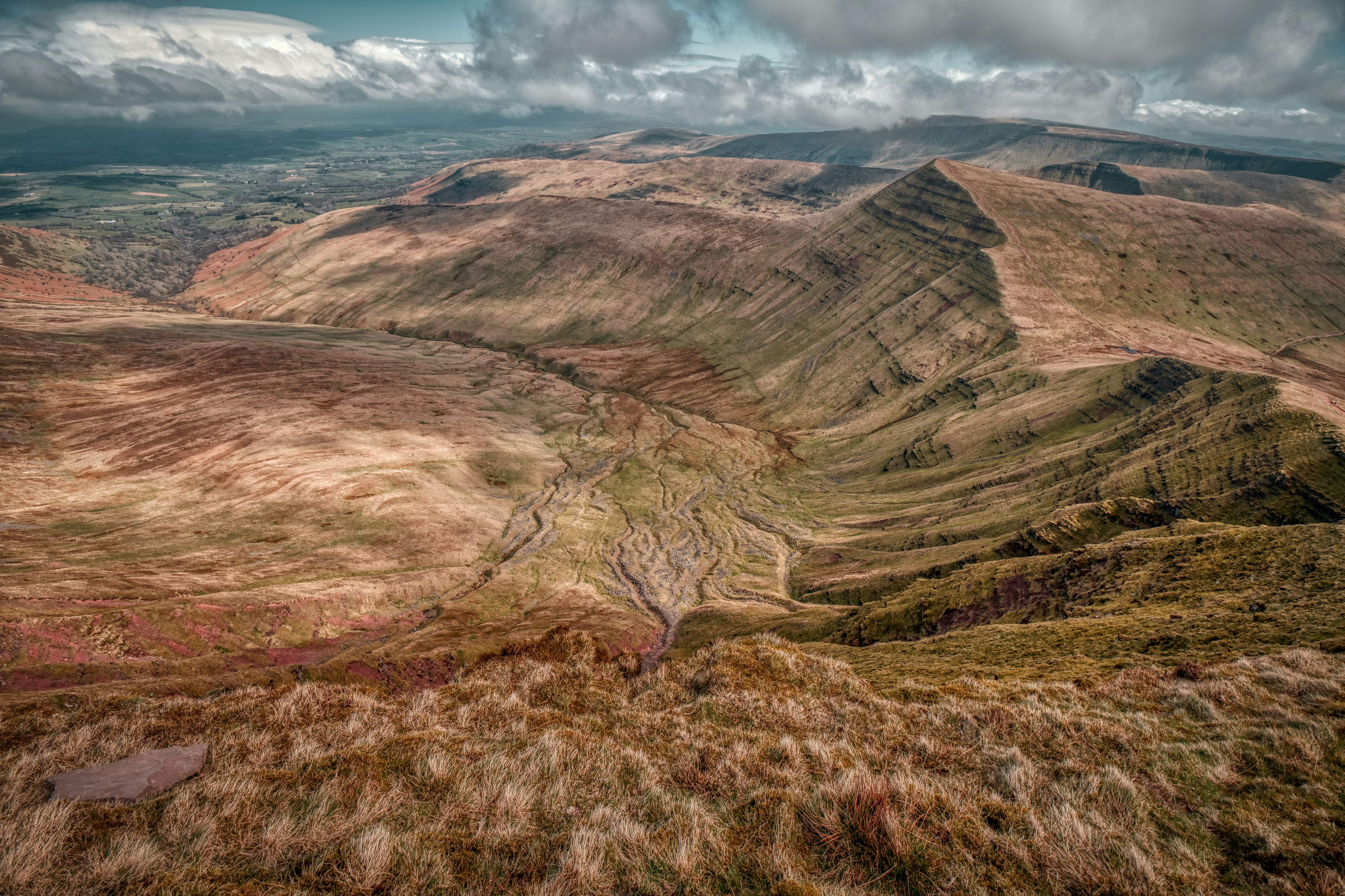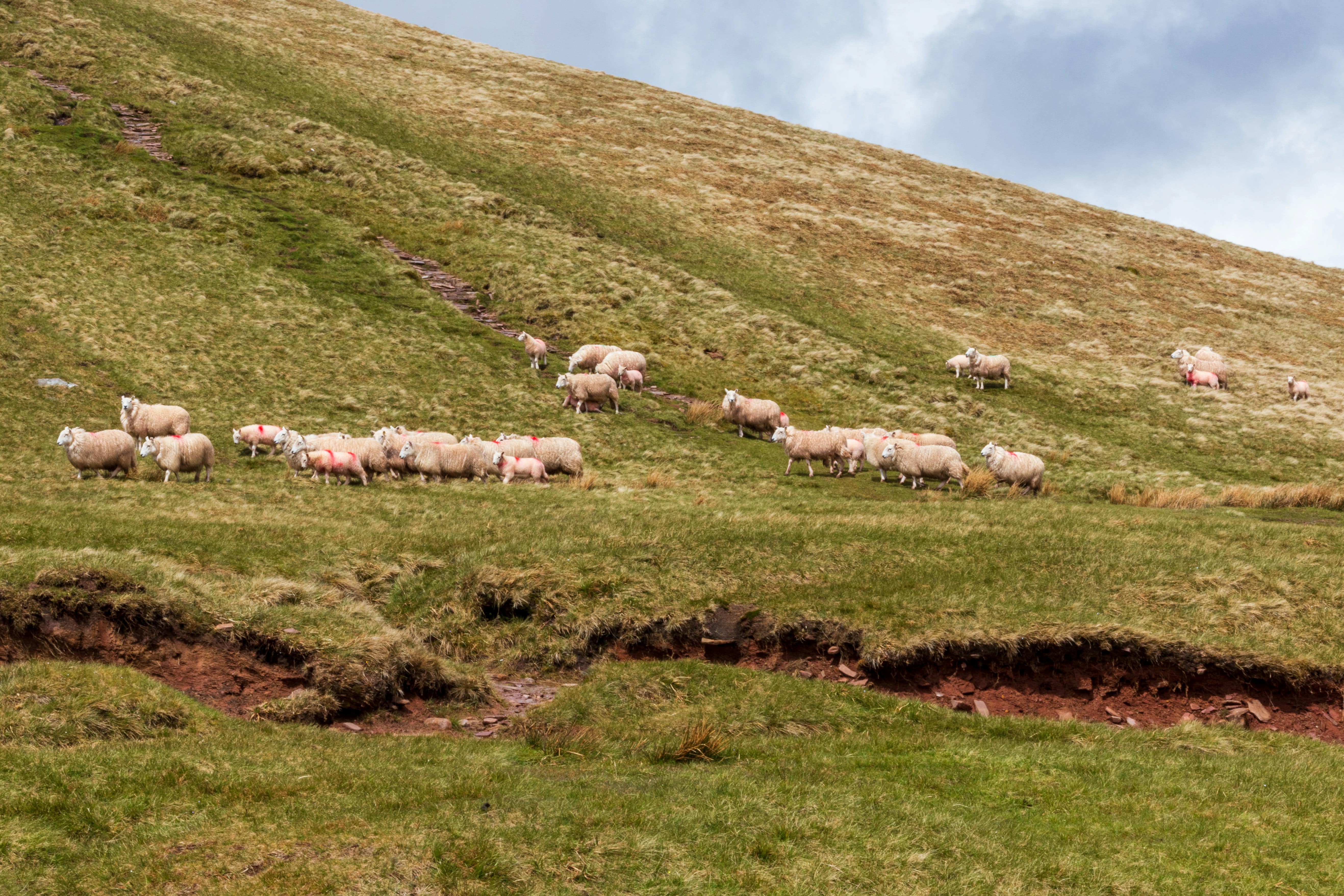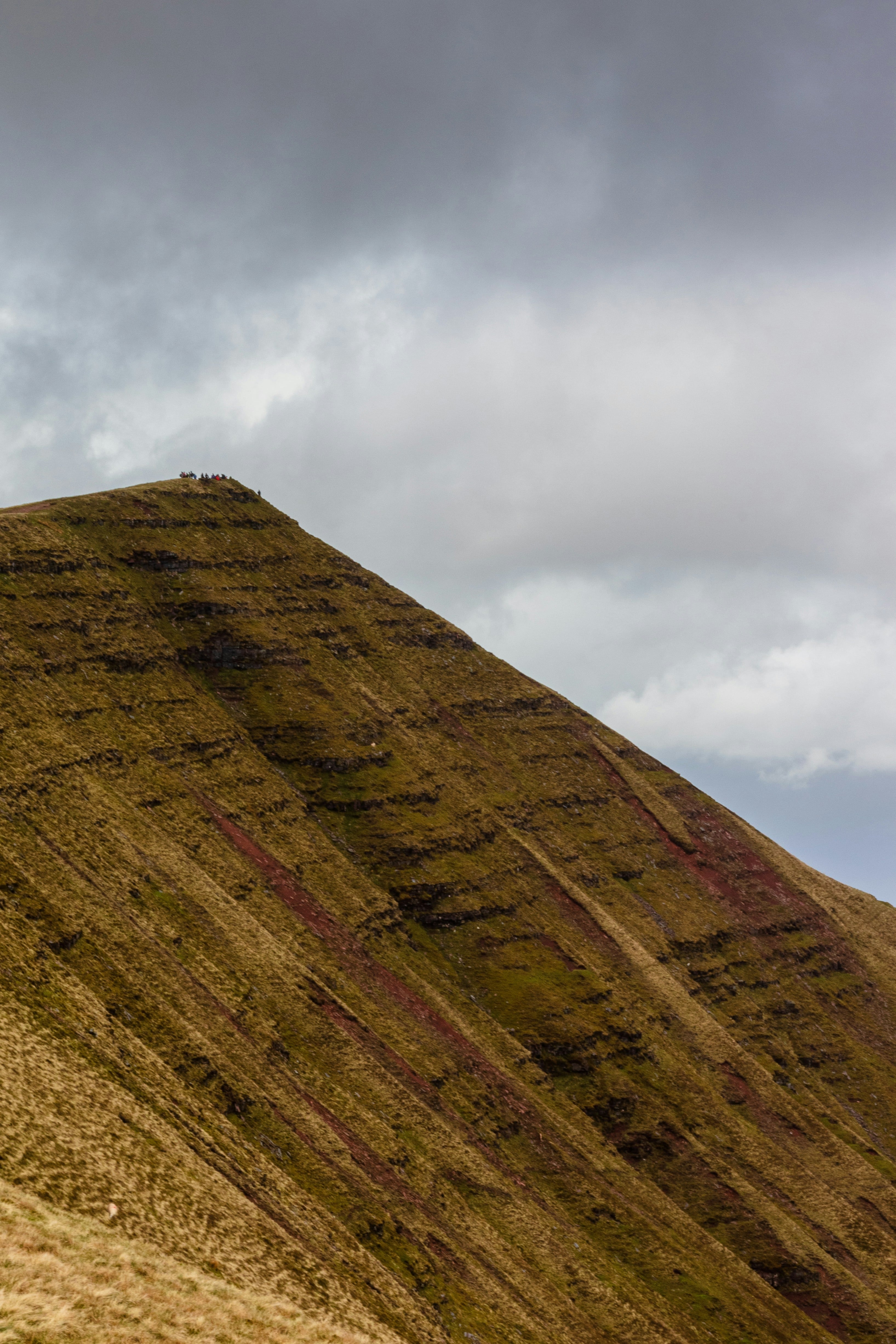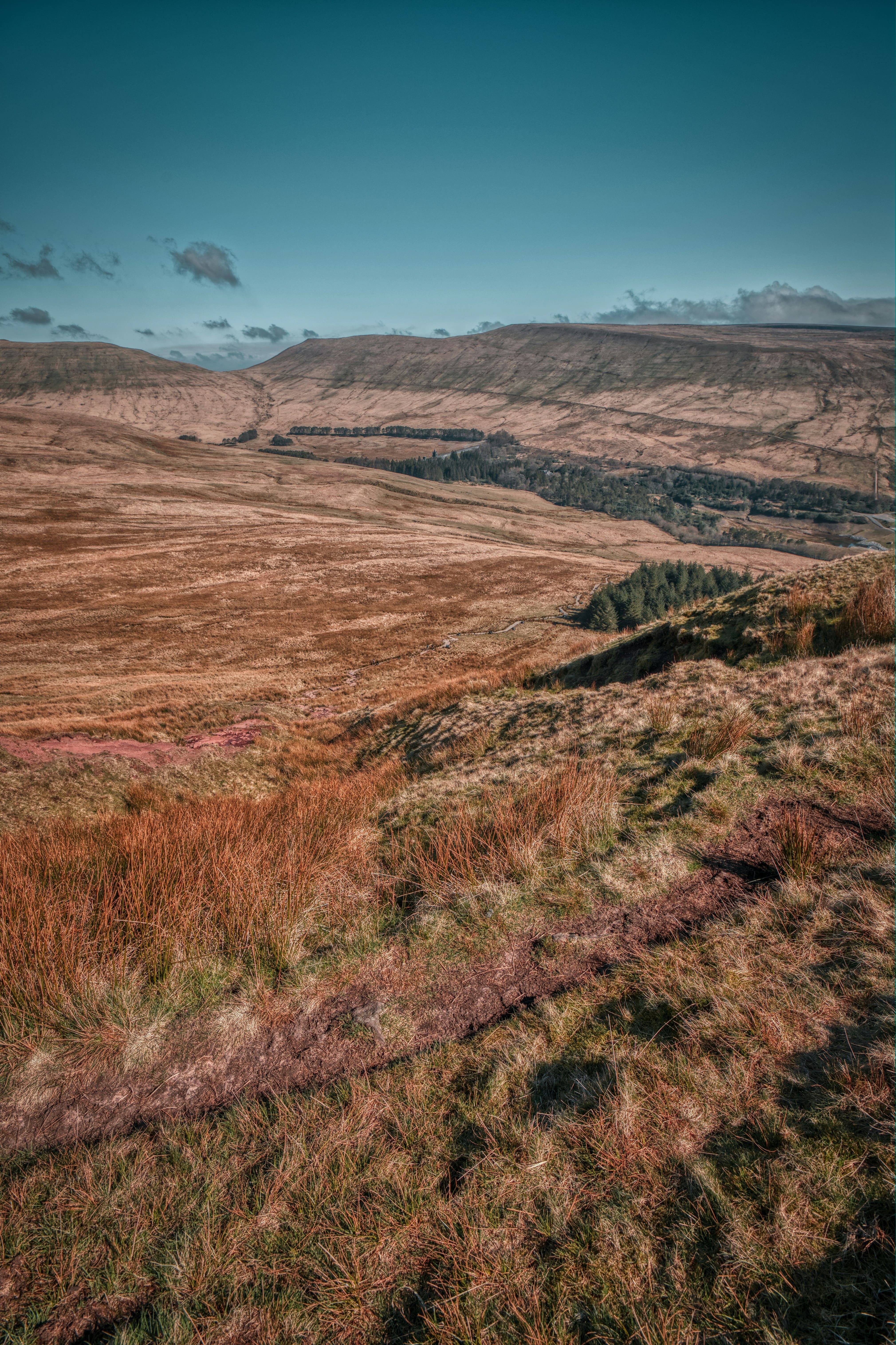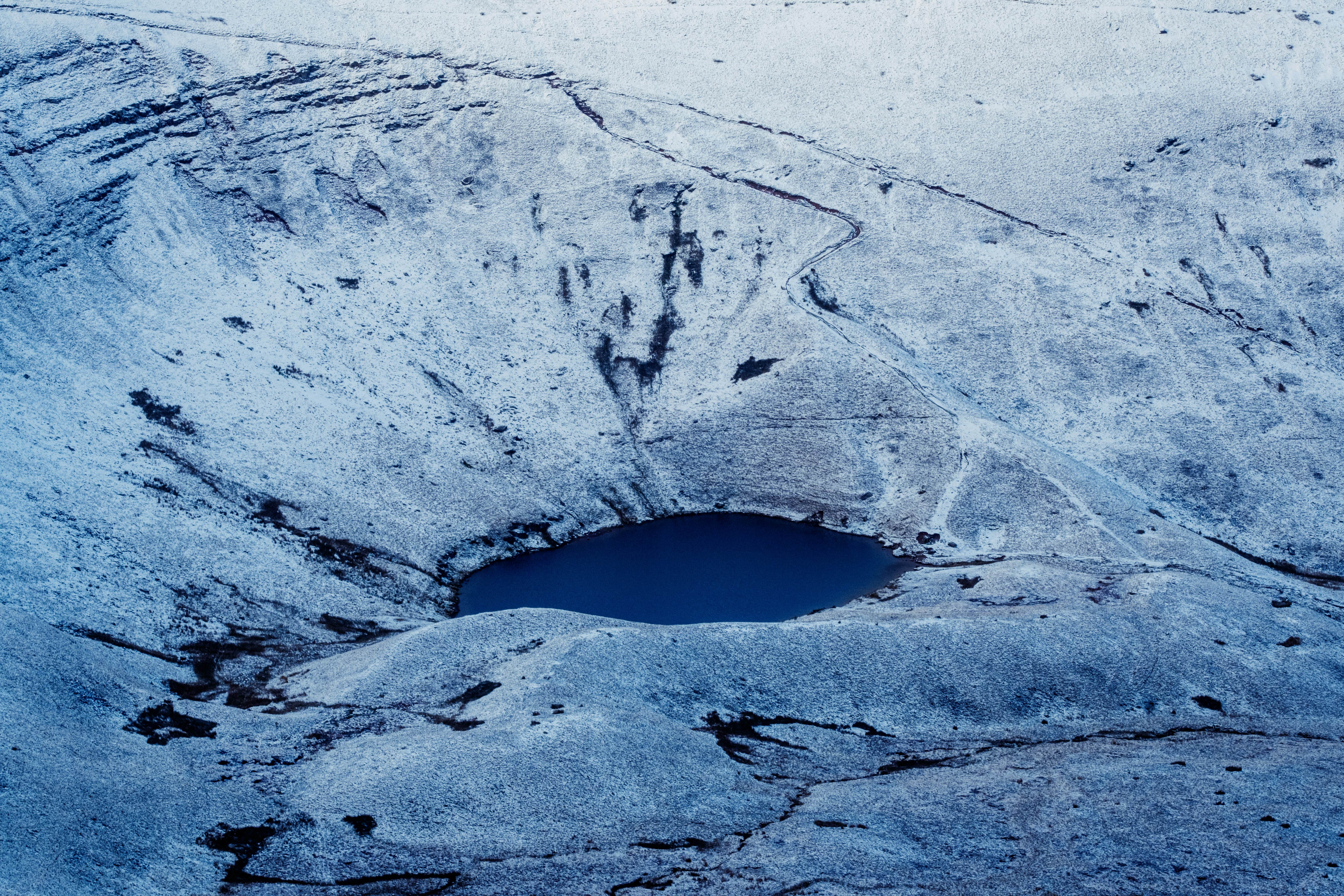Pen Y Fan is the highest peak in south Wales, reaching 2,907 feet (886 metres) elevation above sea level in the Brecon Beacons mountain range. It is an iconic, instantly recognisable landmark that attracts huge numbers of hikers, mainly for the conquering of its summit to admire panoramic views.
Sat squarely in the heart of the National Park, Pen Y Fan is a pyramid shaped peak famous as much for its steep, undulating slopes as its height. With a distinctive silhouette viewable from miles around, it seems to protrude straight up from the surrounding upland plateau.
Pen Y Fan
Popularity
Such is the allure of climbing Pen Y Fan to soak up the superb views, it receives around 150,000 visitors per year. Many come to tick off conquering its height as a bucket list goal while on holidays to the area.
Those who live locally and further afield return repeatedly to hike the peak too for fitness or simply because reaching the summit never loses its magic. On sunny weekends especially, its trails and car parks swarm with avid walkers in a pilgrimage to the top.
The high traffic is evidence of the huge appeal of South Wales's imposing yet totally accessible highest point. The reward and satisfaction of scaling iconic Pen Y Fan clearly remains a hugely popular rite of passage.
Folk Tales & Legends
Echoes of this ancient awe filter subtly into local legends that still endure today on rural tongues. Some revolve around the capricious visibility often cloaking Pen Y Fan's high ground in cloud and mist.
Old Welsh folk tales speak of mischievous spirits who drape magical white tablecloths over the summits to hide them suddenly from mortal view below! Others attribute the peaks disappearing into enveloping rain or fog as the work of witches casting troublesome spells!
The Love Goddess
Another legend tells of a daughter goddess called Pen Y Fan associated with love, nature and female beauty in old Welsh mythology. Her alluring sisters were also linked to other lofty Brecon Beacons peaks.
In some mystical tales, a hunter hero journeys through the wild mountain forests in wooing pursuit of the goddesses over many days and nights. Their feminine charms inspire his epic quest to climb up near heaven to reach their cloud-wrapped domain.
Location and Access
Pen Y Fan lies in the mid-northern section of the vast Brecon Beacons National Park in South Wales. It's positioned roughly at grid reference SO 01230 21490, so 1km west of the A470 trunk road.
The mountain sits around 5 miles (8km) northeast of the popular Storey Arms outdoor pursuits centre in the heart of the park. It's approximately 6 miles (10km) almost directly north of the historic market town of Brecon.
Being so central within the rugged uplands here, Pen Y Fan enjoys excellent access. Major roads dissect the park while smaller local routes provide final few mile approaches. So exploring it makes for a fine day out from numerous spots in the region.
Access Roads
The major A470 trunk road between Merthyr Tydfil and Brecon passes around 1 mile east of Pen Y Fan as it crosses the middle of the National Park. It carries a lot of visitors straight through dramatic scenery underneath the peak's slopes.
Approaching Pen Y Fan from Brecon, the key access road is the A4059. This winds north initially following the River Usk through gorgeous wooded valleys from the town. It then climbs higher across bleaker moorland hills to the village of Talybont and eventually joins the A470.
The minor mountain road of the B4560 also approaches Pen Y Fan's foothills from the north. Branching off the A470 T junction, it loops via picturesque Taf Fechan reservoir before reaching parking areas.
Starting Points
There are three main car parks close to Pen y Fan that provide trailheads to begin the awesome ascent on foot. Each gives access to different but equally interesting walking routes up to the iconic summit at 2,907ft.
Pont ar Daf car park sits right at at the foot of Pen Y Fan below Cribyn peak. It's the starting point for tackling the tough Pyg Track but rewards with the most direct stunning views. There's parking for 160 cars plus toilets and an information board.
Storey Arms is a very large car and bus park on the A4059 about 1km north of Pen Y Fan. As well as being the base for the zig-zagging Cribyn and Beacons Ways trails, there's also a cafe and toilets here. It gets extremely busy in peak periods.
Cwm Gwdi is a designated parking zone in the Bwlch valley passed on the B4560 road north of the peak. Trails here rise more gently over scenic grasslands to reach the main ridge. It holds around 50 vehicles so is less crowded than the other starting points.
Walking Routes & Trails
There is an excellent network of waymarked walking trails leading from the three key access car parks up to Pen Y Fan’s 2,907ft summit. Well-trodden paths cater for all abilities whether veteran mountaineer or casual rambler.
The three most popular and distinct routes are the Pyg Track, Cribyn route and Carn Pica Trail. All ascend over high moorland but each provides a slightly different gradient and landscape to ultimately bask in the same awesome peak views.
Pyg Track
The Pyg Track sets off directly west from Pont ar Daf car park to commence the classic Pen Y Fan ascent. Named after nearby glacial feature ‘Bwlch y Pigwn’, this rugged trail soon climbs steeply via erosion-preventing stone steps.
The Pyg Track arrows due west then zig-zags south directly up the crest of Cribyn. This topof the route tops out at 2,60ft before the final push northwest along the ridge to Pen Y Fan. The path is an average 1.5m wide with a loose stone surface.
Overall this trail is 4.5 miles (7km) there and back. It packs in nearly 1,500ft (450m) of ascent but is the most direct, visually dramatic route up from valley floor to peak summit. Time needed is around 3hrs for most walkers in reasonable fitness.
Cribyn Route
The gentler Cribyn route starts at Storey Arms car park and initially follows the Beacons Way path west parallel to the A4059 road. It zig-zags up across bleak hillside before reaching a junction at Bwlch ar y Fan col.
Here the ongoing Beacons Way carries on west over rolling grassland. But our Cribyn path branches north tracking the foot of Pen Y Fan’s slopes to reach Cribyn's ridge. A final 600ft push northeast then gets you to the ultimate summit destination and its views.
This trail totals 6 miles (10km) return with about 1,300ft (400m) of ascent in total. Its more gradual gradient suits families or new mountain walkers with average time to complete being 4hrs.
Carn Pica Trail
This meandering walk begins at remote Cwm Gwdi car park then gently climbs northwest over marshy moorland on a good path. It passes a series of small glacial lakes before ascending grassy cwms to reach Bwlch Glas.
The path narrows beyond here as it negotiates rough outcrops then stone steps up to the main Pen Y Fan ridge. At 3 miles this trail boasts the easiest overall gradients but still packs in almost 1,500ft (450m) of total ascent over its 8 mile round trip.
With an average 5 hours duration, the Carn Pica Trail provides walkers seeking more gradual slopes their own more scenic way up to Pen Y Fan's epic roof of Wales platform. Taking things easier doesn't mean skimping on those awesome views when you get there!
Ascending & Descending
Hiking to conquer Pen Y Fan involves considerable ascent and descent. With around 1,500 feet (450 metres) of climbing from base to summit, make sure you have suitable footwear, stamina, physical fitness and most of all, take your time!
Well-worn paths, stone steps and boardwalks assist in the steepest sections. But wear suitable footwear with grip and ankle support for stability over uneven trail surfaces. Carry enough water, energy-rich foods and essentials like weather gear for all situations. A map, compass and whistle are also musts for responsible hikers in these mountains.
As all routes eventually converge on the summit, you can take different paths to vary your descent if preferred. Many hiking purists always seek to climb and descend via the same trail. However, the choice to create a full ridge or circular route walking via the connecting summits and ridges of Corn Du and Cribyn is there.
Beware the steep drops either side! Beyond demarcated trails the slopes plummet drastically in places. Keep well back from cliff edges and unprotected falls. The rocks and soil underfoot is often loose and slippery in the Brecon Beacons too, especially when wet.
So proceed sensibly, take extreme care near unfenced ridges, stay well away from precarious slopes and limit risks. Make your descent as cautiously as your ascent up Pen Y Fan. That way you will finish your successful summit bid tired but intact!
Pen Y Fan Summit
The Summit Zone
The actual highest point of Pen Y Fan stands at 2,907 feet (886 metres) elevation. On clear days, the summit provides jaw-dropping 360 degree panoramic views for miles across the peaks and valleys of the Brecon Beacons.
The summit viewpoint is marked by a trig point marker on top of a sizable stone platform. This makes a fantastic spot to plant your feet after the lung-busting final ascent and enjoy a well-earned rest to absorb the breathtaking vistas all around.
Epic Panorama
From Pen Y Fan’s lofty vantage point on a bright day, your eyes trace miles of scenic delight whichever way you look. It’s truly an astonishing roof of Wales platform surveying epic mountain terrain.
The main sightlines of course extend across the grassy whaleback slopes and ridges of the neighbouring Brecon Beacons peaks. The rockier pointed summit of Corn Du stands tall to the west, framed by the rolling hills receding into blue distance.
To the north, the pastoral country of mid Wales fades far into the horizon. Eastwards you look across the wild moorland hills rolling down to Merthyr Tydfil in the valley below. Southwards, the fields and woodlands stretch lazily down towards pretty Talybont village and further to Brecon.
With scenic splendour whichever way you glance, drinking in Pen Y Fan’s fabulous panorama makes all the knee-weakening effort reaching here worthwhile!
Corn Du & Cribyn
The steep-sided slopes of Corn Du at 2,900 ft make an impressive sight across Cwm Llwch to the west. The rock-strewn pointed peak stands proud just 26ft below Pen Y Fan, separated by the grassy hollow called Bwlch ar y Fan.
Eastwards, the craggy slopes of Cribyn define the first section of our ascent up the Pyg Track. Its summit ridge stretches out northwards leading the eye towards mistier distant Welsh peaks on the skyline.
Changeable Conditions
While Pen Y Fan’s expansive views can extend for up to 60 miles in crystal clear air, weather conditions often limit visibility. Claggy low cloud or the odd isolated rainbow shrouded summit can equally mark conquering Wales’s roof.
But whatever the fickle weather decides during your hard-won visit, Pen Y Fan always oozes scenic drama. Mist swirling around its slopes may even enhance its mystique! Just standing South Wales’s highest peak feels a proud achievement in itself.
As the Welsh mountain weather saying goes "If you can see the summit, expect to be rained on before you reach it!" So pack waterproofs, map compass and first aid even in summer just in case!
Descent Options
On departing the summit, you can return to your start point by the same trail. Alternatively for more varied walking, it's possible to create horseshoe ridge routes taking in Corn Du and Cribyn by joining other paths.
There are great views to enjoy descending whichever way you opt to complete the circuit. But respect the steep slopes and always stick to proper designated trails. This ensures you end your successful Pen Y Fan odyssey tired yet elated!
Wildlife at Pen Y Fan
The landscapes surrounding mighty Pen Y Fan host a diversity of animal and plant life. The peak stands amidst a habitat mosaic of crags, moorland, streams and pockets of woodland, each home to distinct species.
From birds of prey hovering on thermal winds to hardy high altitude flora, Pen Y Fan's slopes reveal intriguing wildlife as well as awesome scenery. Some species survive only in these harsh conditions found at 2,900 ft altitude.
Birds
The aerobatic sight of birds of prey riding air currents above the peaks is a common thrill. Red kites, merlins, peregrine falcons and buzzards all regularly patrol the uplands here.
At lower levels around the mountain, listen and look out for smaller moorland specialists like meadow pipit, skylark and wheatear. Their songs and sightings add to the joy of walking among spring heather and gorse.
Through autumn and winter, flocks of fieldfare and redwing migrate in from Scandinavia to feed on berry bushes. And the musical purring call of ring ouzels echoes around craggy outcrops and rocky scree slopes they prefer.
Mammals
Pen Y Fan stands within the largest continuous block of breeding habitat left in Wales for polecats - a scarce member of the weasel family. So keep eyes peeled around dawn and dusk as this elusive creature hunts rabbits and hares.
In wooded valleys on lower slopes, lucky walkers might spy shy red deer and agile grey squirrels. And various bat species hunt moths and midges at dusk too around the foothills and access roads.
Plant Life
The thinner soils, harsh weather extremes and special mineral content of Pen Y Fan's high ground supports uniquely adapted plants. Contorted forms of wind-pruned hawthorn and rare lichen species cling to existence.
Hardy grasses like wavy hair-grass and heath rush carpet areas of deep peat and provide graze for iconic wild Welsh ponies. Heather, bilberry and crowberry splash the slopes vivid purple through summer and autumn.
Geology
The mineral veins, craggy outcrops and loose scree lining Pen Y Fan's trails expose the Brecon Beacons' rich geological past. Search carefully and you might spot fossil ferns or shell fragments from epochs when under tropical seas!
This all helps illustrate why the biodiverse mosaic surrounding Pen Y Fan today is so unique and important for conservation. Enjoy the privilege of hiking through landscapes that inspired pioneer naturalist Gerald of Wales way back in the 12th century!
Geology of Pen Y Fan
The rock formations exposed on Pen Y Fan and surrounding peaks provide remarkable evidence of powerful geological processes spanning 350 million years. The story told here features tropical oceans, deserts, volcanoes and mighty glaciers!
Sandstones laid down in ancient seas were shoved upwards then sculpted over time into the contours surrounding today's iconic summit. Mineral veins, loose scree slopes and weathered outcrops all help tell the tale.
Old Red Sandstone
The bedrock shaping most of the immediate landscape around Pen Y Fan is a type of sedimentary rock called 'Old Red Sandstone'. Vast layers were deposited as sands, muds and silts on deserts and coasts over 100 million years from 400 to 300 million years ago.
Once desert dunes and coastal mudflats, these mineral grains compacted into durable rock beds up to 3km thick blanketing much of South Wales and beyond. Their iron content gives them a distinct red tinge noticeable on many trails here.
Uplift & Volcanoes
Around 300 million years past, monumental earth movements saw the joining of disparate continents into one giant landmass called Pangea. Great collisions of tectonic plates forced up mighty mountain belts distorting many rock layers beneath.
This violent uplift shaped the outlines of our modern-day Pen Y Fan and Brecon Beacons. Plumes of hot magma welled up through fractures intruding as quartz or dolerite vein features. Explosive long-gone volcanoes also left their legacy in mineral traces.
Ice Ages & Cirques
Fast forward 200 million years and the chilly grip of repeated ice ages remoulded the existing landscapes hereabouts even more. Glaciers up to 1km thick ground over high ground, carving out classic cwms and sharper arêtes.
Look northeast from Pen Y Fan to spot the perfect example - Cwm Llwch cirque, gouged out by frozen ice yet framing the pointed peak of Corn Du. Its breached dam also created the long lake of Talybont Reservoir below.
Legacy
Erosion from harsh climate continues modifying Pen Y Fan's slopes today, most recently during stormy winter 2013 floods. But wandering trails here remains a journey back through ancient worlds very different to modern Wales.
Pilgrimage to Pen Y Fan's Summit
Spiritual Parallels
Reaching any mountain summit resembles completing a rewarding spiritual pilgrimage. Surmounting physical and mental challenges leading to revelation about wider perspectives. Pen Y Fan provides this scenic crescendo as profoundly as any British peak.
The step-by-step journey echoes a devout pilgrim’s structured quest. Preparations and planning precede the arduous expedition itself. The pathway has waymarkers for guidance like stations of the cross. Discomforts and sacrifices are made enroute to the life-affirming climax.
Trail Phases
The long trail upwards from the valley floor sees landscape and outlook gradually transform around the pilgrim. A growing sense of remoteness from modern trappings often brings deeper connection with nature or inner self.
As the roof-peak of Pen Y Fan finally crests into sight after hours on the move, a rush of emotion swells just like religious travellers nearing sacred ground after long-held vision. Elation, relief, joy, trepidation even.
The awe is heightened further when standing atop the summit surveying newly revealed vistas. A feeling of insignificance yet privilege arises when gazing at epic grandeur.
Perspective & Vision
Viewing the world anew from Pen Y Fan’s apex means widened physical and spiritual horizons alike. The panorama stirs a humility and wonder at forces grander than humankind. Our transient place amidst the eternal climate-sculpted peaks breeds fresh perspective.
This new sightline forged by reaching the summit brings not just physical exhilaration but thought-shifting psychological insight too. Pen Y Fan makes pilgrims dig deeper inside themselves through its externally testing ascent.
Few outdoor quests then feel so metaphorically enriching as conquering the roof of Wales. No wonder many walkers descend transformed, as though enjoying an uplifting religious epiphany atop this wind-blasted yet spiritually calming viewpoint.
Guide to Climbing Pen Y Fan
Preparing To Climb
When preparing to attempt the rewarding yet knee-testing ascent of Pen Y Fan, careful planning and preparation is key. Choosing your preferred hiking trail, checking weather forecasts and packing suitable gear will make your summit bid more enjoyable.
Assessing the distance, gradient and ruggedness of routes is essential to match abilities of your group. Factor in total lengths, ascent/descent profiles and realistic pace timings. The classic Pyg Track is shortest but steepest for example.
Appropriate clothing, footwear, provisions, emergency kit and fully charged devices are all essentials. A detailed weather check the night before is wise too - conditions on exposed peaks can be very different to valleys!
Discovery Gateway Centre
The state-of-the-art Pen Y Fan Discovery Gateway Centre opened in 2018 provides the perfect launch point to plan your ascent. Conveniently located near Pont ar Daf car park at the foot of the Pyg Track, it welcomes all.
As well as an large off-road parking zone for 100 cars and buses, facilities include a cafe, toilets and exhibition space. Local materials give it a sustainable design sympathetic to the landscape.
Interactive information panels inside detail the cultural heritage, geology and ecology giving context to climbing nearby Pen Y Fan. Guided activity lists, 3D scale models and children's events also help guests prepare to explore the area responsibly.
So calling here first when tackling Pen Y Fan allows browsing of displays on what makes this special mountain environment unique and important. Grabbing a hot drink in the cafe and chatting to staff provides that extra readiness to tackle the slopes!
Climbing Day
On the big day itself, arrive early before trails get busy and eat a hearty breakfast first. Pack sufficient water and high-energy foods to power efforts and remain hydrated. Dress in layers for unpredictable weather shifts.
Stick closely to designated paths for safety, use hiking poles on steep sections and pace efforts gradually. Remain aware of dangers like steep unfenced drops. Check navigation aids regularly ascending and take great care descending.
Respect any weather deterioration, restrictions or diversions due to erosion. Avoid foolhardy risks. But enjoy the immense satisfaction and widescreen rewards waiting atop iconic Pen Y Fan!
Pen Y Fan remains a British mountain of special allure. For its magnificent panorama, unique geology and charisma that still captures minds like no other southern Welsh peak. Tough yet rewarding to ascend, changeable yet so spiritually uplifting in sunlight.
Hopefully this detailed breakdown gave you ample sense of precisely why Pen Y Fan merits iconic status. The levels of interest, history and natural diversity bound within its slopes span all human emotions. Respect, caution and preparation are advised when tackling the ascent. But inspiration, challenge and revelation will stay your rewards upon attaining that unforgettable summit zenith.
Related Articles

Let us know you agree to cookies
We use marketing, analytical and functional cookies as well as similar technologies to give you the best experience. Third parties, including social media platforms, often place tracking cookies on our site to show you personalised adverts outside of our website.
We store your cookie preferences for two years and you can edit your preferences via ‘manage cookies’ or through the cookie policy at the bottom of every page. For more information, please see our cookie policy.


